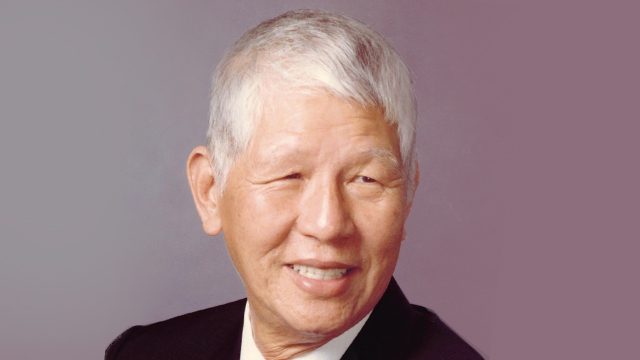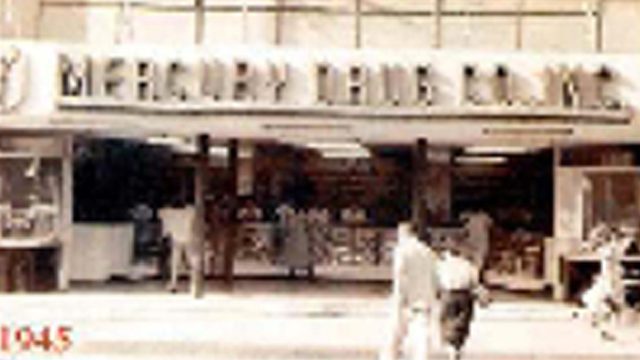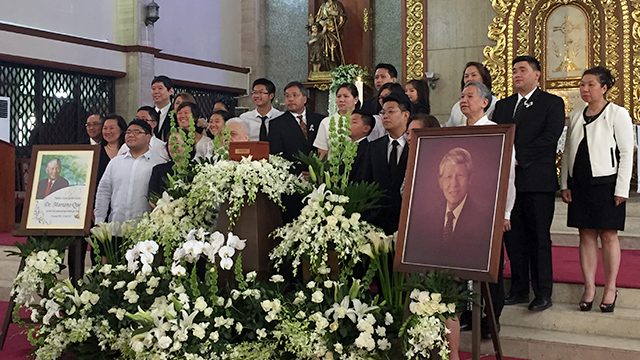SUMMARY
This is AI generated summarization, which may have errors. For context, always refer to the full article.

MANILA, Philippines – On a summer afternoon, Perry Como’s “Sunrise, Sunset” sounded over the church’s speakers. As the man’s life played out on the projector screens, the crowd watched in silence – Mariano Que, they said, was always in a hurry to grow up.
About 96 years later, the people he loved most gave their last farewell. At the funeral mass in Greenhills on April 17, an army of purple uniforms dotted the church pews. The rows were filled by self-titled “Mercurians,” those who followed and worked for Que; each one fashioning a pin affixed with an image of the roman god, Mercury. (READ: Mercury Drug founder Mariano Que dies)
In a way, it is impossible to talk about Philippine medicine without mentioning Mariano Que. Yet for the larger part of things, so little was known of the man who built Mercury Drug – the most prominent name in the Philippine pharmaceutical retail industry.
But those who knew Que best say this is exactly how he wanted it to be.
Father Rolando De la Rosa, former rector of the University of Santo Tomas (UST) and longtime friend of the Que family, spoke, “I shall remember Dr. Mariano Que as a great innovator and entrepreneur whose business practice was marked by humility…(he was) a self-effacing man who abhorred the limelight.”
Echoing the same sentiment, Jacinto Concepcion, the most loyal of Que’s followers, stood before the crowd and said, “You may have heard or read some things (about Que) but I would like to tell you some behind-the-scenes [stories],” in a mix of English and Filipino. Concepcion had known and worked for Que for 62 years.
Inside the crowded church, there were those who came to pay their last respects, to listen to the tale of Mariano Que from the people who witnessed it and remembered it through their own lives.
Mercury rising
Like most legends, Que came from a time and place unknown to many today.
Orphaned at an early age, Que lived through World War II and rose to build an empire, which set out to cure the sick. It is a story that echoed the history of the kind of persons from a single era; those whose lives were made as the world reared from a period of destruction.
When the war ended, Manila was a wasteland and Mariano Que knew this. From the rubble he built Mercury Drug, one pill at a time.
With the city in ruins after the Japanese occupation, Que knew Filipinos would need medicine. Having worked in a drugstore prior to the war, Que sold medical vials and capsules until he saved enough money to pocket a bottle of sulfathiozole pills. It was the miracle drug that made Mercury Drug. (READ: How Mariano Que built Mercury Drug with P100)

Bottle of pills in hand, Que sold the medicine piece by piece until he saved up enough money to buy an assortment of medicines, which he later peddled in a pushcart. Betting all his savings on an idea, Que put up the first branch of Mercury Drug in Bambang Street, Manila in 1945.
“At a time when the country had a reputation for propagating shoddy drugs, he focused mainly on quality through a system of continuous improvements of medical products and services,” recalled Fr. De la Rosa.
It was Que’s honesty and integrity that carried him through a career that spanned over half a century, building a business now worth over P110 billion in sales as of 2015.
“(When Que interviewed me) I showed him my diploma and he told me only two things: “You can start working. But do not cheat me and do not lie to me,” said Concepcion.
He added, “That is why, to all my Mercurians, honesty is our number one (value).”
Concepcion continued to share the series of battles he and Que faced together: from the flu epidemics in the 1960s, to cut-throat price competition, and what he described as Mercury Drug’s “invasion of Visayas and Mindanao.” “Sir, papaano ho iyan?” (Sir, what will we do?), Concepcion asked.
To which Que replied, “We will survive.”
‘On, sail on’
The nature of Que’s character to simply continue moving on from one sale to the next, one battle to the next, one year to the next, was another lesson those closest to him claimed he repeated throughout his years.
“He doesn’t say much. But that’s something that I learned from my dad: no matter what you do, no matter what you face – whether you’re afraid, whether you’re going to lose – just do it. That’s my dad,” said Rino Que, the 8th child and youngest of Mariano Que’s children.
“His motto was ‘On, sail on,’ ‘Que sera sera,’ (whatever will be, will be). That is my dad,” he added.
Que’s headstrong nature was one that took him on a series of firsts.
With Mercury Drug, Que pioneered the delivery of medicines to customers, the expansion of store operating hours, and the self-service concept in its medical retail stores.
Taking on the Ayala group’s invitation to set up another store was almost unheard of at the time, when retailers stuck to their only and existing location. After opening the brand’s second store in Makati City in the 1960s, Mercury Drug would also be the first pharmaceutical retail business to set up centralized warehousing, biological refrigerators, and drive through services.
In the 1970s, Que proceeded with the purchase of Medical Center Trading Corporation, allowing the company to exapnd into the sale of medical supplies and equipment.
These, along with unique business practices, were the tactics that allowed Mercury Drug to gain its sizeable market share.
“We were both graduates of UD and UB—the university of Divisoria and university of Bambang,” narrated Concepcion. Tracing its roots to the Spanish Colonial era, Divisoria is a massive market place in Manila known as a treasure trove for low-priced goods and wholesale items; Bambang, a one-stop location favored by medical personnel for supplies.
“We have learned the Chinese way of doing business: shake hands,” the faithful employee and friend added. He shared that the company has never signed a notarized form or contract regarding terms and agreements when doing business with its suppliers.
“It is through shake hands. ‘I trust you. We are not asking for the moon, we are just asking for what is our work. This is your work; this is my work.’ That is it – no more, no less,” added Concepcion.

Dispute with son
Mariano Que was a father figure to many. During the founder’s memorial service, members of the Que family spoke before the church, which, too, was filled by a number of its extended Mercury Drug family.
Seven of Que’s 8 children: Vivian, Fortune, Joanne, Rose, Rino, Ida, and Martiniano were present and the entire church listened patiently as each – save for Martiniano – spoke of their father.
Que and his eldest son, Martiniano, had a history of feud over control of Mercury Drug.
In 2008, Martiniano filed a suit against his father and his sister, Vivian, to stop the settlement of a P300-million agreement. Inked in 1994, it laid out the sale of all of Martiniano’s shares and interests in the family’s companies and properties in exhange for the said amount.
Martiniano wanted the court to declare the 1994 agreement void as he claimed he never received the P300 million payment, effectively disinheriting him.
The suit and subsequent appeal, however, were dismissed in 2011. Mariano Que maintained he had paid his son the P300 million.
Looking out into the crowd, Ryan Que, a grandson of Mariano, spoke on behalf of his late father, Luis, and said, “You have built a legacy of family that treats everybody with respect, kindness, and humility.”
Fr. de La Rosa, in his homily, shared that Que ran Mercury Drug as though it was a part of his family. The seamless connection of both business operations and family life lead to Que’s insistence that his daughter, Vivian, and late wife, Estelita studied pharmacy.
Today it is Vivian who is at the helm of the Mercury Drug business, serving as the company’s president. “While it is true that he had a certain standard, he was patient and understanding and appreciative of our struggles to do better,” she said.
Vivian added, “Rest assured, his legacy will never die because together, we will continue what my father has started. ”
Vivian Que Azcona was listed in Forbes Asia’s Most Powerful Women List in 2014 and is among the top 50 richest families in the Philippines, with a net worth of US$ 900 million as of 2016. In 2012, Azcona was also the Philippines’ top taxpayer, paying P131.43 million in regular income tax.
The role of a father figure was one Que assumed even outside of Mercury Drug.
Que, along with those who worked with him, started a number of programs that brought medical goods and services to impoverished communities. He also established scholarship programs that helped to provide education to deserving candidates.
Que was also a recipient of a number of titles and awards, including the 1973 President’s Award, for being the most prestigious drugs manufacturer and distinguised civic leader, Father of Philippine Health and Wellness Retailing, from the Philippines Retailers Association in 2012, and most recently, an honorary Doctor of Humanities degree from UST in 2015.
Both Vivian and Fr. De La Rosa shared that the UST event was a moment deeply cherished by Que. It was a rare instance in which he had made a public appearance.
At the ceremony, Que delivered a brief speech to accept the honor, “I lived my life doing what I think was needed to be done. May I prove myself worthy of this honor,” he said. Que was 95 years old at the time.
The real thing
In his homily, Fr. De La Rosa, shared that in a rare press interview of Que, the businessman uttered: “My life’s priorities are these: first, God; then my family; my country, my work, my health, and my peace of mind. I believe that success is measured not by the accumulation of wealth nor the building of business empires, but the way one is able to use his life and resources to serve and touch the lives of others. In my heart, I hope and pray that I was able to do this and make a difference in this world,” said Que.
In her eulogy, eldest daughter Vivian, 61, heir to the throne, said, “We found out that the way to the top is from the bottom… I know the days ahead will not be easy for all of us… Rest assured, I find great comfort in knowing that although I can no longer see you, you will be with me.”
Vivian has been tasked to carry on the work of her father. She assumed the company’s presidency in 1998, when her father retired from Mercury Drug.
Outside, flower wreaths from individuals and institutions – the Ayala Malls Group, University of Santo Tomas, University of Asia and the Pacific, Rizal Commercial Banking Corporation (RCBC), Bea Campos, Joy Campos, and JG Summit’s John and Elizabteth Gokongwei – lined the chapel’s surroundings.
Mariano Que’s life may indeed live on in legacy and legend. But for those who loved and knew him best, he was the real thing. – with reports from Chrisee De La Paz/Rappler.com
Add a comment
How does this make you feel?
There are no comments yet. Add your comment to start the conversation.